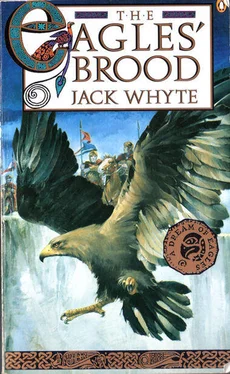A quick conference with my officers confirmed my assessment. There was no safe means by which we could split our party now that we suspected—and had to believe—that what we had assumed to be a self-sufficient band of marauders might in fact be but one element of a much larger force: an invading army.
I sent Lucanus to distribute the fifteen most seriously wounded men among three of our huge wagons, redistributing their remaining cargo among the others. Then I detached a forty-man squadron to augment Pellus's scouts, first making them change out of their uniforms, enabling Pellus to throw a wider and more mobile protective screen around us as we moved. Those arrangements in place, we struck out again for Camulod, driving on as quickly as we could without seriously threatening our wounded and, for that same reason, keeping to the main road as the most level and direct route, knowing that it was also the most visible and therefore the most vulnerable.
The full truth began to assert itself within hours. Large as it was, the group of "raiders" that we had inadvertently come upon was as I had now begun to fear, no more than a skirmishing force, a single faction of a wide-ranging but rapidly coalescing army that must number in the thousands. As returning scouts began to come galloping from all directions with news of hostile sightings, a picture of the emerging situation formed quickly in my mind. Large groups of soldiers—I had no choice but to consider them soldiers, undisciplined and ungovernable as they might be—were converging, mainly on foot, upon some prearranged meeting point that seemed to lie to the south and west of our present position. According to our scouts, there were horsemen and even a few old-style chariots among these groups, but no evidence of organized cavalry. We had reports of sightings to the north-west and west, and to the east and southeast. I had early sent an extra detachment of fast riders directly to the north, behind us, to see if we were being followed from that direction. We were. A large concentration of mounted men was massed some fifteen miles behind us, using the road as we had. The scout who brought this report had managed to range fairly close to these newcomers, spying upon them from a fringe of trees close by the road, which curved in a wide loop there, winding between two hills. He had then cut across country, avoiding the loop and regaining the firm surface of the road in time to be safely out of sight on his return journey before the large group re- emerged from the hill pass. He was adamant that these people, too, were mere horsemen, undisciplined and formless, definitely not cavalry.
My mind finally made a connection that had been eluding me. Our scouts were passing freely to this point among the various armed groups on which they were reporting simply because there were so many people crossing and criss-crossing the country around us. It was evident that none of the insurgents expected to be challenged or accosted. None suspected that we, or any other forces inimical to their own, were among them. I realized that that state of affairs would continue only until the moment somebody recognized us as being uniformed. That awareness came to me as we descended into a small, wooded valley, which offered us protection for as long as it took us to halt, shed or conceal our uniform armour, and make ourselves look as motley as we could. Although few of us carried any clothes that were not regulation uniform and colours, we did what we could, most of us contriving to disguise our soldierliness, of which we had been so proud until then, under wrappings of torn horse-blankets. There was little we could do about our helmets. They were all of a kind, and we could not very well remove them, for we would have looked even more conspicuous riding to war bare-headed. I broke up that uniformity, however, by having one man in three remove his helmet and carry it at his saddle-bow. They were all short-haired, which endows men with another unmistakable military uniformity, but I hoped that distance would disguise that from casual view. Fortunately, many of our men had acquired heavy, external clothing of one kind or another in Verulamium because of the unseasonably cold weather, and I had seen fit to allow them to do so, more out of necessity than any willingness to allow their appearance to deteriorate.
Before we saddled up again, I explained my thoughts to all of them and impressed them with the need to disguise ourselves even more thoroughly; I ordered all of them to be aware, from now until we could no longer disguise ourselves; of the urgent need to avoid anything and everything that could be recognized as military formality or discipline. Having spent years learning to ride as a unit, I told them, their lives now depended on appearing to be a rabble.
We emerged from the little, wooded valley around noon, looking nothing at all like the squadrons who had entered it, and over the course of the next four miles I harangued my men continuously, forcing them to spread out into a straggling, sloppy, widely dispersed train, riding in groups of no more than five together, the majority of them ranging far out on both sides of the roadway whenever the encroaching woods would allow them to do so, thereby creating the impression, I hoped, that no more than forty or so belonged to the party closest to, and presumably escorting, the five wagons we had left in our train. Within one of those wagons, folded and concealed, lay my great black bear standard and all the outward paraphernalia that had previously marked us so clearly as a force to be reckoned with.
A few miles further on, after passing through a long stretch of heavy woodlands, we encountered our first "hostiles." The road emerged from the woods into open grassland, bare of snow now, although the wind was still cold enough to make a mockery of the bright sunlight, and as we straggled out into the glare of the sun, we were confronted by a group of about twenty horsemen approaching the road from our right. They drew rein as they saw us, and sat watching us with suspicion but no outright hostility. Clearly they were prepared to accept us, but were curious as to who and what we were. The suddenness of the meeting crystallized some of the thoughts that had been going through my mind and I acted on impulse, forcing myself to turn casually in the saddle and speak to my companions without betraying any of the chaotic reactions that leaped in my breast.
"Cyrus, spread the word among the men, but do it without being obvious. We are from Northumbria, detached from Verulamium by Vortigern as his ambassadors to other kings. Donuil, come with me. I'm going to speak with these people. The rest of you remain calm and take your lead from me."
I kneed my horse sideways and approached the newcomers as though I had been expecting to meet them. Their obvious leader was an enormous man, bearded, wild-looking and heavily muscled, whose immense frame dwarfed the large horse on which he was mounted. He was armoured in layered thicknesses of toughened bull hide reinforced with plates of bronze, and he carried a large, round shield slung across his back. He sat calmly, reins loose on his horse's neck, and watched me impassively as I advanced, his face betraying nothing of his thoughts. I addressed him in the mixture of Latin and Celtic that I had used with Vortigern's people.
"Well met," I called out when some twenty paces separated us. "I am Ambrose of Lindum, nephew to Jacob, Councillor of Lindum, and the bearer of greetings from King Vortigern of Northumbria to King Lot of Cornwall. This is our first time so far south, and we are without guidance. Can you tell us how far we have to go to the meeting place?"
I was prepared for a challenge and swift action, because the only reference I had had to any meeting place came from my own assessment of the intelligence brought to me by our scouts, but my question provoked no suspicion and no response. By this time I had stopped almost within sword's length of him, and I allowed my gaze to move idly over his companions. They were an unsightly crew, all heavily" armed and armoured like their leader, and all unkempt, with long hair, beards and moustaches. Their leader continued to look at me in silence, considering my words, and then his eyes moved to Donuil, taking in the size of the young man.
Читать дальше









